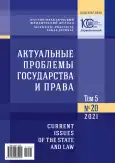Features of financial and legal regulation of public relations in the context of mitigating economic consequences in the fight against the COVID-19 pandemic
- Authors: Savina A.V.1
-
Affiliations:
- Derzhavin Tambov State University
- Issue: Vol 5, No 20 (2021)
- Pages: 670-677
- Section: General Theory and History of Law and the State
- URL: https://journal-vniispk.ru/2587-9340/article/view/304092
- ID: 304092
Cite item
Abstract
The relevance of this study is due to the fact that in the modern world, including Russian, law and order, a special mechanism of “anti-crisis regulation” is being transformed, which in the context of a pandemic has become heterogeneous, with a permanent convergence of the norms of private and public law. Proceeding from the fact that anti-crisis regulation is predominantly part of the state policy in a particular area, it is proposed to understand that the epidemiological crisis itself is the starting point for other crisis phenomena (financial, demographic and other crises), the prevention or reduction of the impact of which is the most important task of any state. We consider the relevant aspects of crisis management. We analyze the categories of countercyclical and pro-cyclical regulation, investigated the issues of fiscal policy. We pay attention to behavioral economics and the role of the state in its functioning. We note that the directions of spending budget funds in one way or another depend on the behavioral economy, which is not always manageable. We provide an analysis of the concept of “choice architecture” in the aspect of a “push” decision-making mechanism, in which a special role is assigned to the state. We emphasize the growing importance of financial programs to support small businesses or citizens wishing to become individual entrepreneurs, self-employed.
About the authors
Anna V. Savina
Derzhavin Tambov State University
Author for correspondence.
Email: anna.savina56@mail.ru
ORCID iD: 0000-0002-2107-8769
Candidate of Law, Lecturer of Civil Law Department of Law and National Security Institute
Russian Federation, 33 Internatsionalnaya St., Tambov 392000, Russian FederationReferences
- Keyns D.M. Obshchaya teoriya zanyatosti, protsenta i deneg [General Theory of Employ-ment, Interest and Money]. Moscow, CJSC “Bizneskom” Publ., 2013, 402 p. (In Russian).
- Ushakov D.N. (ed.). Tolkovyy slovar’ russkogo yazyka: v 4 t. [Explanatory Dictionary of the Russian Language: in 4 vols.]. Moscow, Astrel: AST Publ., 2000, vol. 4, 1499 p. (In Russian).
- Burakov D.V. Kontrtsiklicheskoye regulirovaniye kredita: povedencheskiy aspekt [Coun-tercyclical credit regulation: a behavioral aspect]. Ekonomika i upravleniye v XXI veke: ten-dentsii razvitiya [Economy and Management in the XXI Century: Development Trends], 2011, no. 2, pp. 123-127. (In Russian).
- Astapov K.L., Musayev R.A., Malakhov A.A. Otsenka effektivnosti politiki byudzhetnykh raskhodov [Evaluating the effectiveness of the budget expenditure policy]. Finansovyy zhurnal – Financial Journal, 2020, vol. 12, no. 6, pp. 9-24. (In Russian).
- Stellinga B., de Hoog J., van Riel A., de Vries C. Introduction. Money and Debt: The Public Role of Banks. Cham, Springer International Publishing, 2021, pp. 1-16. https://doi.org/10.1007/978-3-030-70250-2_1 (accessed 02.09.2021).
Supplementary files








